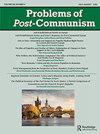政权、气候和地区转型:俄罗斯参与北极理事会
IF 2
2区 社会学
Q2 POLITICAL SCIENCE
引用次数: 14
摘要
北极理事会(AC)是在多个相互竞争的议程下成立的。俄罗斯在其成立过程中发挥了至关重要的作用,此后一直是不可或缺的一员。笔者考察俄罗斯参与的演变,是为了考察政权类型、区域国际组织和环境保护三者的结合点。俄罗斯如何通过亚太经合组织可持续发展工作组(SDWG)为气候变化政策做出贡献?我认为,民主国家和非民主国家都可以利用与环境保护和区域合作有关的问题,在区域之外施加影响,推动广泛的地缘战略关切。本文章由计算机程序翻译,如有差异,请以英文原文为准。
Regime, Climate, and Region in Transition: Russian Participation in the Arctic Council
ABSTRACT The Arctic Council (AC) was created with multiple competing agendas. Russia played a crucial role in its founding and has been an indispensable member since then. I consider the evolution of Russian participation in order to investigate the juncture of regime type, regional international organization, and environmental protection. How has Russia contributed to climate change policies through the AC’s Sustainable Development Working Group (SDWG)? I argue that issues connected to environmental protection and regional cooperation can be used by democratic and non-democratic states in order to leverage influence beyond the region itself and to advance broad geostrategic concerns.
求助全文
通过发布文献求助,成功后即可免费获取论文全文。
去求助
来源期刊

Problems of Post-Communism
POLITICAL SCIENCE-
CiteScore
4.00
自引率
12.50%
发文量
33
期刊介绍:
The post-communist countries are the most rapidly changing societies of Europe and Asia. For insight into this twenty-first century revolution, there is no better source than Problems of Post-Communism. Emphasis is placed on timely research covering current economic, political, security, and international developments and trends in Russia and China, Central Europe and Central Asia, Latin America, and Southeast Asia. Clarity and readability make the articles fully accessible to researchers, policy makers, and students alike.
 求助内容:
求助内容: 应助结果提醒方式:
应助结果提醒方式:


